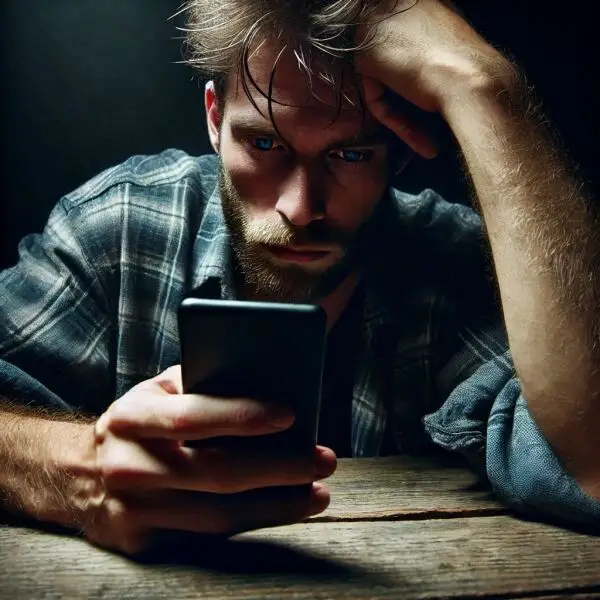How to Rest Our Brain from Social Media
Give Your Brain a Break: Disconnect from Social Media and Combat Neurochemical Imbalance for Lasting Well-being Without Relying on Technology....
Table of Contents
- Is the internet tickling our brains?
- The brain in "dopamine deficit mode"
- How to cope with digital "detox" without dying in the attempt?
- Living Real Life Again
Follow Patricia Alegsa on Pinterest!
Ah, internet! That modern marvel that connects us to the world and traps us in its web like mosquitoes in a virtual spiderweb. But have you ever wondered what happens in your little head when you spend hours aimlessly scrolling through social media?
Let's unravel this mystery and see why disconnecting a bit could be a winning strategy for your mental well-being.
We live in a world where clicks and "likes" govern a good part of our existence. Social media is that virtual corner where we seek entertainment, information, and the occasional laugh with cat memes (who can resist!). However, these platforms can be a double-edged sword for our mental health.
Is the internet tickling our brains?
We live in a world where clicks and "likes" govern a good part of our existence. Social media is that virtual corner where we seek entertainment, information, and the occasional laugh with cat memes (who can resist!). However, these platforms can be a double-edged sword for our mental health.
In 2024, the term "brain deterioration" took the crown as the word of the year according to Oxford University Press, highlighting the growing concern about the effects of excessive digital content consumption.
Here's a fun fact: every time we receive a "like" or a positive comment, our brain rewards us with a rush of dopamine, the pleasure hormone. It's like a boost of joy! But, just like with sweets, too much is never good.
Did you know that the brain has a way of balancing those spikes of dopamine? When we spend too much time seeking those small digital rewards, the brain reduces its production of dopamine to avoid being overwhelmed. It's like your brain is a very strict accountant! This can lead to a cycle where we need more time on social media to feel normal. And of course, here come apathy and anxiety, like uninvited guests to the party.
But, not everything is lost! Experts suggest that a break from social media can make a big difference in our brain health. Anna Lembke, a wise expert in addiction medicine, states that these breaks allow our brain to "reset" its reward circuits. Can you imagine having a brain like new? Well, almost.
Leaving social media may sound as terrifying as facing a Monday without coffee, but it's simpler than it seems. Studies show that even small breaks have remarkable benefits. One example is a study with 65 girls who showed significant improvements in their self-esteem after just three days of pause. Three days! That's less than a long weekend lasts.
At first, a digital detox may seem like a gigantic challenge. Anxiety and irritability might come into play, but don't worry. Sarah Woodruff, co-author of a study on these effects, assures that this initial period is temporary. The good news is that, after a week, the detox usually becomes more manageable, and you might even start to enjoy it!
After a detox, avoiding relapse is crucial. Experts recommend creating physical and mental barriers to limit impulsive access to social media. Have you ever tried leaving your phone out of the room at night?
Here's a fun fact: every time we receive a "like" or a positive comment, our brain rewards us with a rush of dopamine, the pleasure hormone. It's like a boost of joy! But, just like with sweets, too much is never good.
The brain in "dopamine deficit mode"
Did you know that the brain has a way of balancing those spikes of dopamine? When we spend too much time seeking those small digital rewards, the brain reduces its production of dopamine to avoid being overwhelmed. It's like your brain is a very strict accountant! This can lead to a cycle where we need more time on social media to feel normal. And of course, here come apathy and anxiety, like uninvited guests to the party.
But, not everything is lost! Experts suggest that a break from social media can make a big difference in our brain health. Anna Lembke, a wise expert in addiction medicine, states that these breaks allow our brain to "reset" its reward circuits. Can you imagine having a brain like new? Well, almost.
How to cope with digital "detox" without dying in the attempt?
Leaving social media may sound as terrifying as facing a Monday without coffee, but it's simpler than it seems. Studies show that even small breaks have remarkable benefits. One example is a study with 65 girls who showed significant improvements in their self-esteem after just three days of pause. Three days! That's less than a long weekend lasts.
At first, a digital detox may seem like a gigantic challenge. Anxiety and irritability might come into play, but don't worry. Sarah Woodruff, co-author of a study on these effects, assures that this initial period is temporary. The good news is that, after a week, the detox usually becomes more manageable, and you might even start to enjoy it!
Living Real Life Again
After a detox, avoiding relapse is crucial. Experts recommend creating physical and mental barriers to limit impulsive access to social media. Have you ever tried leaving your phone out of the room at night?
They also suggest replacing endless scrolling with activities that offer deeper gratifications, such as learning to play an instrument or cooking. Not only is it fun; it's a way to release dopamine in a more balanced manner.
Finally, planning regular breaks from social media can help us reflect on our relationship with these platforms. During a detox, you might ask yourself: do they really help me connect with others or do they distract me from face-to-face relationships? The answer may change your perspective on the time you spend online.
So, the next time you find yourself caught in the digital whirlwind, remember: a break, even a small one, can be the first step towards a healthier relationship with the virtual world. The power is in your hands!
Finally, planning regular breaks from social media can help us reflect on our relationship with these platforms. During a detox, you might ask yourself: do they really help me connect with others or do they distract me from face-to-face relationships? The answer may change your perspective on the time you spend online.
So, the next time you find yourself caught in the digital whirlwind, remember: a break, even a small one, can be the first step towards a healthier relationship with the virtual world. The power is in your hands!
Subscribe to the free weekly horoscope
Aquarius Aries Cancer Capricorn Gemini Leo Libra Pisces Sagittarius Scorpio Taurus Virgo
-
 The Shocking Story of the 'Bonzo' Suicide of a Polish Philosopher
The Shocking Story of the 'Bonzo' Suicide of a Polish Philosopher
Ryszard Siwiec, the first 'bonzo' of the West, self-immolated in protest against communism. His letter, received 22 years later, reveals his tragic story. -
 Okinawa Diet: The Key to a Long and Healthy Life
Okinawa Diet: The Key to a Long and Healthy Life
Discover the Okinawa diet, known as the 'recipe for longevity.' With low-calorie foods and antioxidants, it promotes a long and healthy life. -
 This woman lives alone, healthy, and happy at 106 years old. What is her secret?
This woman lives alone, healthy, and happy at 106 years old. What is her secret?
Discover the wellness and nutrition secrets of Dorothy Staten, a 106-year-old woman who still exercises and lives alone. Be inspired by her longevity! -
 Spring Astenia? Discover how to manage its impact on your mood
Spring Astenia? Discover how to manage its impact on your mood
Spring Astenia: discover how the change of season impacts your energy and mood. Learn to recognize and manage its effects. -
 Social Media: The Hidden Dangers for Children and How to Protect Them
Social Media: The Hidden Dangers for Children and How to Protect Them
Discover how social media affects children and adolescents: exploitation, sextortion, and cyberbullying endanger their mental and physical health.
I am Patricia Alegsa
I have been writing horoscope and self-help articles professionally for over 20 years.
Subscribe to the free weekly horoscope
Receive weekly in your email the horoscope and our new articles on love, family, work, dreams and more news. We do NOT send spam.
Astral and numerological analysis
-
 Discover your future, secret personality traits and how to improve in love, business and life in general
Discover your future, secret personality traits and how to improve in love, business and life in general
-
 Online Dream Interpreter: with artificial intelligence
Do you want to know what a dream you had means? Discover the power of understanding your dreams with our advanced online dream interpreter using artificial intelligence that responds to you in seconds.
Online Dream Interpreter: with artificial intelligence
Do you want to know what a dream you had means? Discover the power of understanding your dreams with our advanced online dream interpreter using artificial intelligence that responds to you in seconds.
-
 6 Ways to Be More Positive and Attract Good People into Your Life
6 Ways to Be More Positive and Attract Good People into Your Life
Learn to be a positive and cheerful person to attract more quality people into your life. Discover how happiness and fulfillment can become your constant companions. -
 30 misleading tips on love, happiness and success
30 misleading tips on love, happiness and success
Advice you are often given that, in reality, can be misleading to your life. -
 Incredible!: They monitor employee productivity with artificial intelligence
Incredible!: They monitor employee productivity with artificial intelligence
A video that went viral in the last few hours shows how with artificial intelligence, they manage to monitor workers instantly. Watch the amazing video! -
 He is 58 years old, but looks 20, let me tell you his secrets
He is 58 years old, but looks 20, let me tell you his secrets
Discover the secrets of Chuando Tan, the 58-year-old influencer who looks 20. His lifestyle and diet are key to his incredible youth. -
 Discover the fruit rich in Vitamin D, excellent for your bone health
Discover the fruit rich in Vitamin D, excellent for your bone health
Discover the fruit that shines in vitamin D, crucial for your bones and well-being. Beyond the sun and fish, this delight will surprise you. -
 Survival in Avalanches: How Long Can a Human Endure in the Snow?
Survival in Avalanches: How Long Can a Human Endure in the Snow?
Discover how long a human can survive under a snow avalanche. A mountaineer in Bariloche survived 'by a miracle'. Learn about the science behind it! -
 Constant tiredness in older adults: the warning sign you must not ignore
Constant tiredness in older adults: the warning sign you must not ignore
Constant tiredness in old age? Experts from Cleveland Clinic warn: persistent fatigue may be hiding serious illnesses. Seek medical advice in time. -
 Low-impact exercises for the knees
Low-impact exercises for the knees
Discover low-impact activities recommended by experts and improve your quality of life in adulthood. Transform your well-being today! -
 What does it mean to dream of a house?
What does it mean to dream of a house?
Discover the meaning of dreaming about a house in this article. Understand what your dreams may be trying to tell you and make more informed decisions in your life! -
 What does it mean to dream of shooting stars?
What does it mean to dream of shooting stars?
Discover the true meaning of dreaming of shooting stars - will they bring you good luck or a warning from the future? Read our article to find out! -
 How your zodiac sign can completely ruin a date
How your zodiac sign can completely ruin a date
Find out how your zodiac sign can ruin a date in this article - don't miss it! -
 What does it mean to dream of wilted flowers?
What does it mean to dream of wilted flowers?
Discover the hidden meaning behind your dreams with wilted flowers. Learn how to interpret this dream sign and its impact on your daily life. -
 Discover the darkest part of you according to your zodiac sign
Discover the darkest part of you according to your zodiac sign
Discover your most mysterious characteristics according to your zodiac sign - be surprised by what we reveal!